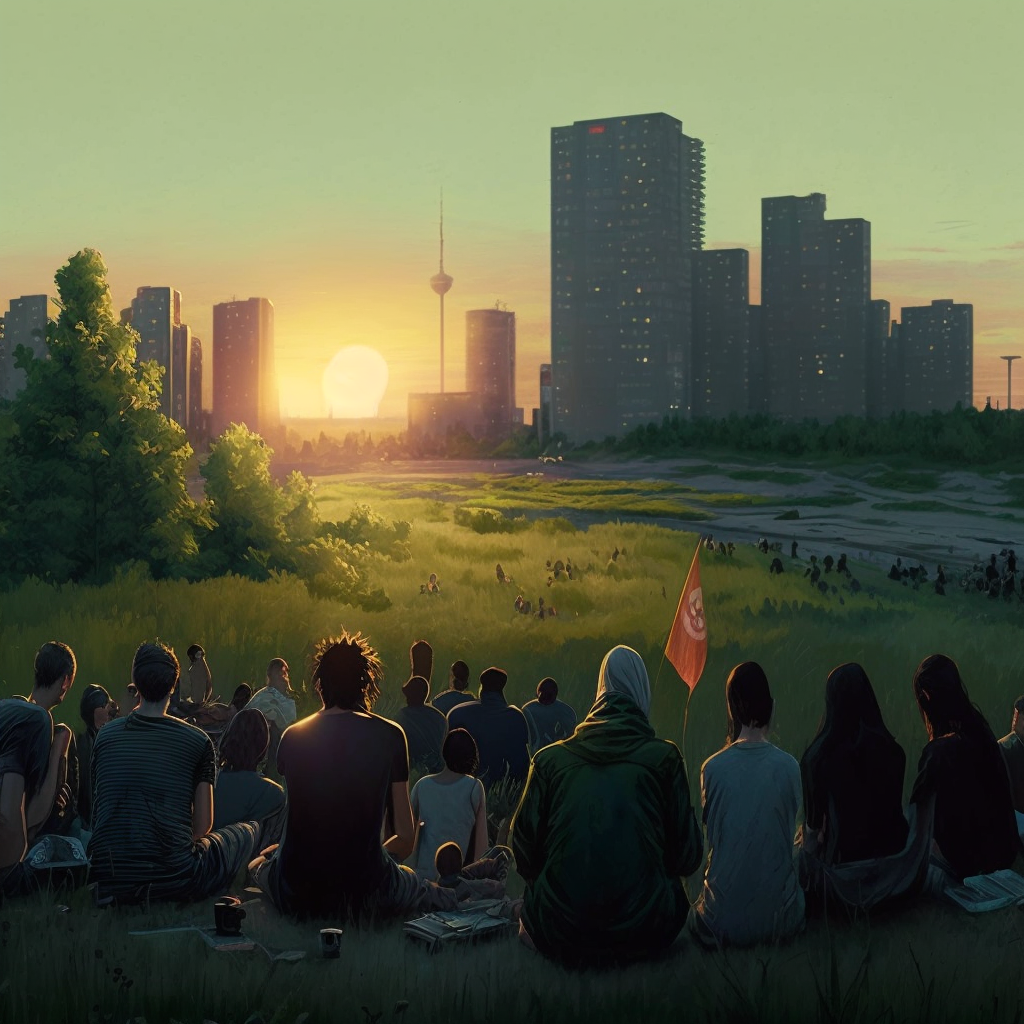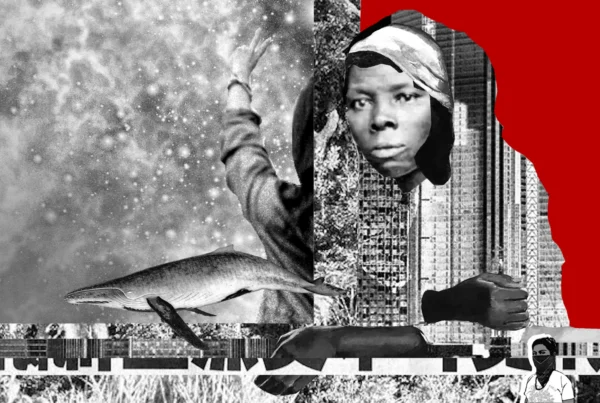The Undisciplined Environments Collective supports and relaunches the call from the organizers of the World Congress for Climate Justice, to be held in Milano (Italy) from October 12 to 15, 2023.
The aim of this call is to bring together movements from all continents to Milan to strategize intersectionally against fossil capitalism. The drought that has scorched Europe, China, North America and the flood that has submerged Pakistan have made all too apparent the mortal threat we are collectively facing in this climate emergency.
Never has the threat posed to human societies by unconstrained growth been greater than today. However, at the moment systemic alternatives to fossil capitalism are struggling to emerge in the battle against neoliberal doctrine, supremacist clericalism and authoritarian ethnonationalism, all nefarious ideological forms united by climate denialism.
Since 2018 climate justice movements have entered a new mass phase, surviving the freeze on social mobilization imposed in many regions of the world by the pandemic, and have crossed the paths of racial justice movements against police violence in 2020, feminist and queer movements against patriarchal reaction, and today are joining protests for social justice and against high energy prices in several countries.
Starting from the dramatic urgency and from this trajectory of conflicts, we want to open a space of discussion between explicitly anti-capitalist climate movements, activists and intellectuals from all over the planet, with the ambition to define a common agenda and ideological horizon in the shared transnational space of the ecosocial struggles of the present.
The war unleashed by Putin by invading Ukraine has split the world into two opposing camps: the Euro-American (with Japan, Korea, Australia, New Zealand) and a Sino-Russian sphere on the other. We belong to the third camp, that of anti-authoritarian, postcolonial, solidarity movements that fight for a world where capitalist extraction and nationalist competition will become obsolete. We side with anarcho-autonomists and antifas in Ukraine, Belarus, Russia. We side with the victims of war, especially Ukrainian women and children, and hope Putin’s neo-czarism will be defeated.
However, let us desert the race for militarism in the west. A race useful only for the merchants of death in the service of the overlords of fossil capitalism. There is nothing moral about this horizon. Faced with the climatic apocalypse, Europe and the United States are arming themselves to defend their primacy as global consumers of the biosphere. And to do so, they increase oppressive police powers at home, and abroad give legitimacy to reactionary gangsters like Erdogan, and assist political systems based on slave labor, apartheid and deportation like in the Middle East and North Africa, or tolerate genocidal wars like those occurring against Rojava and Tigray.
The World Congress for Climate Justice wants to respond to the urgency of the current struggle against fossil capitalism and open a space for transnational exchange and debate with the aim of reaching deliberations on resolutions and proposals for action for international alliances and mobilizations. Our goal is to re-instil a sense of hope and a horizon of liberation in the manifold movements across the planet that defend ecosystems, the right to cities, and act against the fossil installations and infrastructures of global capitalism. And to do this, we consider it essential and a priority to reconnect the struggles for climate justice with those for social justice and labor unionization against oligopolists and oligarchs, increasingly obscenely rich. Transnational ties and intersectional alliances to build a present of climate justice and liberation, starting from the practices of feminist and queer movements, radical labor campaigns and anti-racist fronts, building on new practices of organization and conflict, oppositional lifestyles, modes of energy and food production and consumption, universal access to income, health, and housing, to information and knowledge: a culture for the precarious many, not for the wealthy few.
We foresee a three-day weekend in Milan in October 2023, where delegates from movements, collectives, unions, territories and social spaces in struggle, from neighborhoods and fields, classrooms and offices, of all genders and from all over the world, can discuss these issues and arrive at common strategies, drawing on the experience of large-scale environmental protests and autonomous zones. We are thinking about many parallel sessions around a large array of topics from climate science to essential workers, and few common deliberative moments, but we leave to you to suggest the subjects of discussion in Milano.
Let’s fight for the liberation of Earth from capitalist greed and fascist depredation.
Love ‘n’ Revolution!
Here is the website of the Congress: http://www.wccj.online/en/call/
And here the preliminary program: http://www.wccj.online/en/first-meeting/
To write to the organizers: [email protected] / / [email protected]
To get updates on the Congress through Telegram: https://t.me/+t57dA04zrp9jMDRi
(all images courtesy of WCCJ)








EVERYTHING CHANGES – NOTHING IS LOST
Building Functional Practices Towards a Regenerative Society
The renewal of a deformed society, one that has a viral insatiability, a gluttonous draining of the life-energy of the earth, to one that stresses revitalisation, cleansing and builds an abundance of diversity.
We read about environmental problems such as changes in the global climate… about ozone depletion, ocean pollution, or wars over oil… But rarely are these grave matters linked to the imperatives of global economic expansion now accelerated by free trade, the overuse of resources, and the consumer lifestyle that’s being promoted worldwide…s
“The current system is a globally imposed hegemony of private vested interests, the service of which has been detrimental to the beautiful and naturally bountiful Earth, as well as systematically deconstructing the Universal Bond of Common Unity between its peoples, without which freedom, peace, abundance and mutually beneficial co-operation between nations cannot exist.”
All of these issues—overcrowded cities, unusual new weather patterns, the growth of global poverty, the spread of new diseases, the lowering of wages as profits and stock prices are soaring, the elimination of social services, the destruction of the environment—are part of the same global process. They are of one piece, a fabric of connections resulting from the world’s new economic arrangement, all in the cause of an economic ideology that cannot serve social or ecological sustainability.”
A Systemic understanding of Society as an aid to bringing about a transformational change
Society as viewed from a systems theory perspective is undeniably unstable and in danger of a breakdown or dissipation. The present society’s systemic structure is order within a chaotic whole, that is contrary to systems that are, healthy with the ability to adapt to environmental changes. Robust systemic-structures develop instead diametrically, have a nucleus that is ‘chaotic’ within an ordered periphery, making a dynamic whole, receiving information and reacting in a vigorous resilience to surrounding changeing conditions.
Life’s intentional infinite purpose or objective if you will, is diversity and divergence, it is systems that have enabled it’s manifestation and then functioned as life’s vehicle or structure on the material plane/existence. . Everything on the material plane or the cosmos, is built on systems. All systems have their own unique life energy, vibrational wavelength or rhythm, which is never destroyed but can be dissipated, collapsing as a system, that which was life’s vehicle of unique material expression. The unique life energy will then be drawn to another evolutionary pattern, the seed of a new structure or concept.
Society is a system which is composed of sub-systems. The health of society, as is the case of any other organism depends on the sub-systems functioning in unity as a whole, symbiotically, and at the same time every sub-system, cell, must act within the whole inter-dependently, self reliantly and self-governing, in keeping it’s integrity healthilly sound. The system has to stay flexible so that it’s ability to adapt to a changing environment is not impeded.
The present society, as a system, is in grave risk of dispersion, all the sub-systems or cells are losing adhesiveness.
From 1970 to 2018, global wildlife populations declined an average of 69%, according to World Wildlife Fund. With these population losses, ecosystems lost benefits of natural carbon capturing behaviours and processes. As populations continue to decline and as species become extinct, the species’ ecosystems can go from capturing carbon to becoming sources of carbon emissions, also collapsing as functioning systems the study found.
“Wildlife species, throughout their interaction with the environment, are the missing link between biodiversity and climate,” Oswald Schmitz, Oastler Professor of Population and Community Ecology for the School of the Environment at Yale University, said in a statement. “This interaction means rewilding can be among the best nature-based climate solutions available to humankind.”
The above is an example of system collapse in natural habitats. Habitats without a working complex of species, is a system breaking-down or dissipating. Society, as a system is connected as an integral part of nature. What happens in nature/ the environment will be mirrored in society. How a society treats the environment, so will their citizens be treated. Without a unified interactive diversity of sub-systems in a system (a micro-climate, environment or habitat, man or society) the system can not adapt, keep it’s integrity secured against an ever alterable, unstable and changeable outer environment, The system begins to breakdown, degrade and eventually disperse causing the life energy to find a new compatible vibrational expression.
Society, as any system must be integrally connected, all sub-systems within the whole, functioning symbiotically, interacting cohesively and adapting to external information exchanges. The individual is society’s smallest sub-system, so society’s harmony, wellbeing and hardiness is reliant on each inhabitant’s health, well-being and cohesiveness as self-regulating individuals, they reflect society’s prosperity, abundance and security. Society’s internal integrity depends on the individuals health, vitality, self motivation and self-awareness. It is it’s inhabitants autonomy, self-reliance and self-governance that builds an evolving society/ a system able to renew itself. then together create the ability to adapt to the outer environmental changes and therefore the ability to develop.
Degrowth is the idea that we should prioritize, regeneration and human well-being over an ever growing economy.
Degrowth comes from the French “décroissance,” which was coined in 1972 by social philosopher André Gorz.
It first emerged as a distinct movement and theory in the early 21st century and entered the English language in 2008.
Between 2000 and 2019, increased renewable energy capacity covered only 16 percent of *’new energy demand’.
Human activity has surpassed five out of nine planetary boundaries: global heating, plastic and chemical pollution, biodiversity loss, habitat loss and nitrogen and phosphorous pollution, and add to that depletion of vital natural resources.
Global Northern countries are responsible for 92 percent of greenhouse gas emissions in excess of planetary boundaries, and wealthy economies are responsible for 74 percent of unsustainable resource use.
The U.S. has the highest GDP in the world but scores behind several countries on well-being indicators, including Panama, Denmark and Costa Rica.
Green growth, ecomodernism are two main schools of thought that propose an alternative vision to degrowth and favour technological change over economic alteration.
The degrowth program includes a jobs guarantee, reduced work time, the end of planned obsolescence and debt forgiveness for the Global South.
Doughnut Economics is an idea developed by Kate Raworth that the goal of economies should be to ensure flourishing within the “doughnut” between meeting everyone’s “social foundation” and the “ecological ceiling” of the nine planetary boundaries. the Steady-state economy is another regenerative system thought to end the corrupt system of eternal growth.
What Is Degrowth?
Degrowth is the idea that the purpose of the economy should not be growth as such but rather ensuring the well-being of everyone in a society without exceeding planetary boundaries. On the most basic level, it can be summarized by the maxim that people in wealthier nations “should live simply so others, human and non-human may simply live.” Proponents of degrowth argue that capitalism as practised today — with an emphasis on increasing Gross Domestic Product and short-term corporate profits — is incompatible with avoiding the worst impacts of the climate and biodiversity crises. Degrowth would mean reducing the energy use of the global economy by curbing the activity of ecologically harmful or wasteful industries in wealthy nations such as advertising or plastics. It is different from a recession because it would not be an unplanned shrinking of the existing economy, which typically leads to job losses and other hardships, but rather a planned reimagining of economic priorities that would focus on a more equitable distribution of existing resources. “We have forgotten how to be good guests, how to walk lightly on the Earth as its other creatures do.”— Barbara Ward
The concept of Basic-wage/Living wage or Universal wage is a way of ridding the world of poverty. Such a system would grant every citizen an unconditional living-wage. Community banks would be established in all populated areas over the whole earth which would govern the establishing and administrating of community banks. An account for the depositing of the Universal wage for every citizen. This wage would cover basic living needs – cost of dwelling, sustenance, public transport needs, clothing, education, child minding for working mothers and would be adjusted to every local economy and cost of living.
The Treaty of Universal Community Trust [also known as UCT Treaty] lays out a set of principles and values by which people and communities can live by, interact with each other, solve disputes, and reach their highest potential.
What is UCT Treaty?The Treaty of Universal Community Trust is a declaration of independence, sovereignty and jurisdiction, founded on the principles of Natural Law. UCT Treaty was ratified by 25 independent sovereign nations of indigenous peoples on 21 June 2012 CE.
What is Natural Law?The principles of Natural Law (also sometimes called the Common Law) can be summarised by the following divine maxim:
“Do no harm, cause no loss, and accept no wrongdoing against yourself.”
Universal Community Trust and the Treaty of Universal Community Trust apply internationally, across existing geographic borders.
Universal Community Trust [UCT] is an umbrella Trust declaring independence, sovereignty and jurisdiction under Natural Law for all the autonomous Sovereign Community Trusts (AnarchoNations/AnarchoTrusts) which sit under UCT.
Under each of those are numerous Private Living/Family Trusts (with their own trustees and beneficiaries). These Private Living/Family Trusts are beneficiaries of the Sovereign Community Trusts.
UCT is a structured mechanism which sets out to protect you, your family and community, as well as *‘your’ (my marking) land, house, material items, and most importantly, your rights and freedoms.
(*a foot note; I the author of this chapter and book, believe private ownership of land too be one of the most destructive ‘rights’ constructed by a traumatized, wealth and control fixated society, and would/should be invalid in a future life supporting society, see my chapter on a regenerated society)
The Doughnut Economy: Think of it as a compass for human prosperity in the 21st century, with the aim of meeting the needs of all people within the means of the living planet.The Doughnut consists of two concentric rings: a social foundation, to ensure that no one is left falling short on life’s essentials, and an ecological ceiling, to ensure that humanity does not collectively overshoot the planetary boundaries that protect Earth’s life-supporting systems. Between these two sets of boundaries lies a doughnut-shaped space that is both ecologically safe and socially just: a space in which humanity can thrive.The Doughnut is the core concept at the heart of Doughnut Economics.
The Doughnut’s holistic scope and visual simplicity, coupled with its scientific grounding, has turned it into a convening space for big conversations about reimagining and remaking the future. It is now being discussed, debated and put into practice in education and in communities, in business and in government, in towns, cities and nations world
What is Doughnut Economics
If the 21st century goal is to meet the needs of all people within the means of the living planet – in other words, get into the Doughnut – then how can humanity get there? Not with last century’s economic thinking.Doughnut Economics proposes an economic mindset that’s fit for our times. It’s not a set of policies and institutions, but rather a way of thinking to bring about the regenerative and distributive dynamics that this century calls for. Drawing on insights from diverse schools of economic thought – including ecological, feminist, institutional, behavioural and complexity economics – it sets out seven ways to think like a 21st century economist in order to transform economies, local to global.The starting point of Doughnut Economics is to change the goal from endless GDP growth to thriving in the Doughnut. At the same time, see the big picture by recognising that the economy is embedded within, and dependent upon, society and the living world. Doughnut Economics recognises that human behaviour can be nurtured to be cooperative and caring, just as it can be competitive and individualistic.It also recognises that economies, societies, and the rest of the living world, are complex, interdependent systems that are best understood through the lens of systems thinking. And it calls for turning today’s degenerative economies into regenerative ones, and divisive economies into far more distributive ones. Lastly, Doughnut Economics recognises that growth may be a healthy phase of life, but nothing grows forever: things that succeed do so by growing until it is time to grow up and thrive instead.
(every lifeform or system, is born, grows into maturity, eventually slowing down in preparation for crossing the river, to the next rebirth or metamorphosis)
All of the above ideas about the transforming of the present destructive economic system, that is anti-humanistic and undemocratic, does not address, the single most devastating element in society, and that is the delusional idea of the right to private ownership of land. I don’t see any possible chance of erasing this seeming self-evident right to land, within the context of the present society’s structure, but such an idea could be incorporated into a new vision of a regenerated society.
With a move to a doughnut economy a lot of the private sector will migrate naturally to the public sector, also called or historically known as the Commons, short for the Common-wealth. This is one transformative bolt necessary in building the doughnut /creative economic system. (the commons or public sector is part of the regenerative, democratic and cooperative grounded Society). The Doughnut economies nature, as has been stated earlier, is true democracy – with an anarchistic heart and cooperative clothing.
Another segment in our present degenerative economic system is food production known as industrial agriculture, which in a change over to the doughnut or cyclic economy, would demand a shift to Regenerative agriculture, Permaculture or Earth/ cyclic agriculture.
A reform of the educational system must be a re-examining and rethinking of it’s role in a cyclic/doughnut societal system. Every child must learn the necessity to renew to a regenerative society.
Another step on the road to regeneration would be the rationing of fossil fuels, which would decrease transport, reduce the related pollution and forcing a huge reduction in energy burning including the unnecessary use of private transportation. Coinciding with the rationing of private transport, would be an extensive (massive) drive to create an extensive network of renewable energy powered rail-based public transport systems servicing all major cities and sub-systems servicing all rural communities. (over an agreed upon size)
All of the above ideas about the transforming of the present destructive economic system, that is anti-humanistic and undemocratic, does not address, the single most devastating element in society, and that is the delusional idea of the right to private ownership of land. I don’t see any possible chance of erasing this seeming self-evident right to land, within the context of the present society’s structure, but such an idea could be incorporated into a new vision of a regenerated society.
Yes, Climate change is borne out by capitalism. Seeking more profit , it is in overshoot path . Humanity in vulnerable pathway , near to extinct if the raising temperature goes up 2″c .
So , make fossil free earth. Revitalise green ecosystem having green socialism value. All are equally born, equally alive and equally protect nature .
It is my voice from Nepal, a himalaya ecosystem.
It is my green solidarity to you.